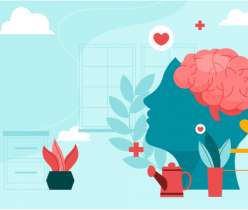Diet can have a great impact on an individual’s mental health, study suggests. Healthy eating practices can influence your mental health in a way that it can improve or decrease your brain function. Nutrition is highly linked to brain, mood, and behaviors.
Link between nutrition and mental health
A majority of people are aware of the fact that eating healthy food is essential to reduce the risk of many physical conditions, including diabetes, heart disorders, obesity, and other common physical problems. Almost all of us know that making healthy food choices will allow us to feel better and when we eat heavy, sugary food items, we can feel tired or lazy. Recent evidence suggests that nutrition can have a great impact on mental health along with the physical health and a number of conditions, including depression are influenced by dietary factors.
There is a close connection between what you eat and what you feel. Following a nutritious diet is not easy for everyone, but it has significant health benefits. Making smart food choice boost not only physical health but also improves mental health. Eating a balanced diet is the best mental health care tip; it is associated with lower incidences of mental disorders such as depression bipolar disorder, and anxiety. Eating poorly can drastically decrease your energy levels and increase your risk of disease.
Food for mental health
Food is a source of energy; it supplies power to your brain as well as your body. Food has a direct relationship to mental and emotional health. People are having learning and memory illness such as Alzheimer’s, Parkinson’s, depression, and schizophrenia benefits of a healthy diet that includes a low-calorie diet with a variety of colorful fruits and vegetables along with salmon fish that contains a high amount of omega 3 fatty acids. According to studies, reducing calorie intake may provide great protection against obesity-related neurodegenerative processes, reduced brain function and as well as cognitive impairment. Eating plenty of wholegrain cereals, leafy greens, and dairy food is the best thing you can do for your brain function. Vitamin B is essential for the better function of the brain. A lean protein present in eggs, chicken, turkey, and beans helps balance serotonin hormone levels in the brain. Low serotonin levels are associated with mental issues like depression and anxiety. The healthy bacteria in yogurt help reduce anxiety and stress in people with mental problems. Probiotics are helpful in keeping the immune system strong and keeping the bad bacteria away from the gut.
This list of mental health care foods helps you balance chemicals in the brain and improve your brain to function properly.
Habits and foods to avoid
To get rid of, anxiety, depression, and any other mental illness avoid sugary drinks as they are known to increase blood sugar levels, which can cause anxiety and also worsen depression. Excess intake of caffeine can also trigger an attack in people who are prone to anxiety. High-fat foods such as dairy products, fried foods, and sugary foods are the main cause of obesity in most people around the world. According to studies, obese people are more likely to have depression.
Exercises to boost mental stamina
Mental stamina exercises such as meditation exercise could help boost your mental health. Exercise is one of the most effective ways to improve your brain condition. Research has found to have a significant impact on regular exercise on anxiety, depression and many more brain disorders. Mental stamina exercises relieve stress, improves memory, allow you to sleep better, and enhance your overall mood.
Follow these easy mental fitness tips to promote a healthy mind.
In case, if these mental fitness tips won’t work, an individual can also go for mental health treatment. Consider talking to a health specialist for more information. Your healthcare provider will prescribe mental health medications that best suit your condition.


